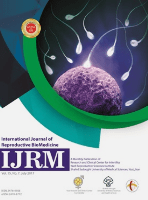
International Journal of Reproductive Biomedicine
Scope & Guideline
Pioneering insights in reproductive biomedicine for all.
Introduction
Aims and Scopes
- Reproductive Health and Disorders:
Research addressing various reproductive health issues, including conditions like endometriosis, polycystic ovary syndrome, and infertility, with an emphasis on understanding their biological and clinical implications. - Assisted Reproductive Technologies (ART):
Studies exploring techniques such as in vitro fertilization (IVF), intracytoplasmic sperm injection (ICSI), and embryo transfer protocols, and their outcomes in different populations. - Experimental and Clinical Research:
Utilization of both laboratory-based experimental studies and clinical trials to investigate reproductive biomedicine, including the effects of drugs, supplements, and procedures on reproductive outcomes. - Genetics and Molecular Biology:
Research focusing on genetic factors influencing reproductive health, including gene polymorphisms, expression studies, and the role of epigenetics in fertility issues. - Women's and Men's Health:
Investigations into the reproductive health of both genders, including studies on male infertility, sexual health, and the psychosocial aspects of reproductive health. - Emerging Therapies and Interventions:
Exploration of novel treatments and interventions in reproductive health, including the use of stem cells, hormonal therapies, and lifestyle modifications.
Trending and Emerging
- Impact of Lifestyle and Environmental Factors:
Increasing research on how lifestyle choices, such as diet and exercise, and environmental exposures affect reproductive health outcomes, reflecting a growing awareness of holistic health. - Personalized Medicine in Reproductive Health:
Emerging interest in tailoring reproductive health treatments based on individual genetic profiles and biomarkers, enhancing the effectiveness of ART and fertility treatments. - Technological Innovations in ART:
A trend towards integrating advanced technologies, including artificial intelligence and machine learning, in optimizing ART protocols and improving outcomes. - Focus on Male Reproductive Health:
A noticeable increase in studies addressing male infertility and reproductive health issues, acknowledging the importance of male factors in fertility and overall reproductive success. - COVID-19 and Reproductive Health:
Research exploring the implications of the COVID-19 pandemic on reproductive health, pregnancy outcomes, and fertility, which has become a significant area of inquiry. - Neuroendocrine Factors in Reproductive Health:
Growing interest in the role of neuropeptides and hormonal interactions in reproductive processes, leading to a deeper understanding of reproductive physiology.
Declining or Waning
- Traditional Herbal Medicines for Reproductive Issues:
Research focusing on herbal remedies and traditional treatments for reproductive health, which has seen a decline as more evidence-based and scientifically validated treatments gain prominence. - Non-invasive Techniques in Reproductive Medicine:
A noticeable decrease in studies centered around non-invasive diagnostic methods, possibly due to the advancements in more effective invasive techniques that provide better outcomes in reproductive assessments. - Psychological Impact Studies:
While psychological aspects of infertility and reproductive health were previously emphasized, there appears to be a waning focus on this area in favor of more direct biological and clinical research.
Similar Journals
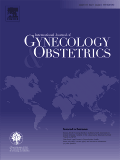
INTERNATIONAL JOURNAL OF GYNECOLOGY & OBSTETRICS
Exploring the Frontiers of Gynecology and ObstetricsThe INTERNATIONAL JOURNAL OF GYNECOLOGY & OBSTETRICS, published by Wiley, stands as a prestigious and influential resource in the fields of medicine and obstetrics and gynecology. With its ISSN 0020-7292 and E-ISSN 1879-3479, this journal has been at the forefront of scholarly communication since its inception in 1973, extending its reach and impact through to 2024. Ranked in the Q1 quartile in both medicine miscellaneous and obstetrics and gynecology, and positioned impressively at 39th out of 209 in the Scopus rankings, the journal is renowned for its rigorous peer-reviewed articles that advance the understanding and practice of gynecological and obstetric health. The importance of this journal is underscored by its role in disseminating cutting-edge research and fostering innovation in clinical practices, making it an essential reading for researchers, healthcare professionals, and students alike. While it does not offer open access, its robust subscription model ensures a wealth of valuable information is accessible to those dedicated to improving women's health globally.
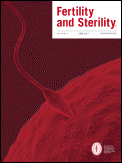
FERTILITY AND STERILITY
Advancing knowledge in reproductive health.Fertility and Sterility is a prestigious peer-reviewed journal dedicated to the fields of obstetrics, gynecology, and reproductive medicine. Published by Elsevier Science Inc, this journal has been a cornerstone of scientific discourse since its inception in 1950 and is set to continue its influential coverage of cutting-edge research until 2024. Boasting an impressive impact factor, Fertility and Sterility is ranked among the top-tier journals in its category, holding Q1 status in both Obstetrics and Gynecology and Reproductive Medicine. With Scopus rankings placing it in the 97th and 96th percentiles respectively, the publication serves as a vital resource for researchers, clinicians, and students who seek to advance their understanding of fertility issues and reproductive health. Although it does not currently offer open access options, the journal remains committed to disseminating high-quality research and innovative solutions to the complex challenges in reproduction, empowering professionals and scholars to make meaningful contributions in their fields.

Gynakologische Endokrinologie
Championing Women's Health Through Scholarly DiscourseGynakologische Endokrinologie is a pivotal journal published by SPRINGER HEIDELBERG, dedicated to advancing the fields of endocrinology, obstetrics, gynecology, reproductive medicine, and pediatrics. With an ISSN of 1610-2894, this journal serves as a valuable platform for researchers and practitioners to disseminate their findings and explore emerging trends and treatments in the realm of women's health and endocrine disorders. Though currently positioned in the Q4 quartile across relevant categories, its mission is to foster scholarly discourse that bridges gaps in knowledge and enhances clinical practices. With a commitment to quality research, it provides a forum for innovative studies and case reports that could influence future healthcare strategies. Positioned in Germany, Gynakologische Endokrinologie aims to cater to a global audience, enhancing knowledge and collaboration in critical areas impacting women's health and hormone-related conditions.

Human Reproduction Open
Elevating standards in reproductive medicine and health.Human Reproduction Open, published by Oxford University Press, is a prestigious open-access journal dedicated to advancing the field of reproductive health and medicine since its inception in 2017. With an E-ISSN of 2399-3529, the journal provides a vital platform for researchers, clinicians, and academics to disseminate innovative findings in obstetrics, gynecology, and reproductive medicine. It is recognized for its impactful contributions, holding an impressive rank of #3 out of 209 in Medicine - Obstetrics and Gynecology, #2 out of 90 in Medicine - Reproductive Medicine, and #1 out of 21 in Medicine - Embryology, placing it in the top percentiles of its respective categories. The open-access model ensures that research is freely accessible, fostering collaboration and knowledge sharing among professionals and students alike. With a commitment to high-quality, peer-reviewed publications, Human Reproduction Open plays a crucial role in shaping the future of reproductive health research and practice, serving as an essential resource for those dedicated to improving outcomes in this dynamic field.

Jornal Brasileiro de Reproducao Assistida
Elevating the discourse in reproductive health.Jornal Brasileiro de Reprodução Assistida is a prominent academic journal focusing on the latest advancements in reproductive medicine, published by the Sociedade Brasileira de Reprodução Assistida (SBRA). With an ISSN of 1517-5693 and an E-ISSN of 1518-0557, this journal has established itself as a vital resource for researchers, healthcare professionals, and students in the fields of obstetrics and gynecology. Notably recognized within the Q2 category for Obstetrics and Gynecology, it ranks #91 out of 209 in Scopus, placing it in the 56th percentile among its peers. The journal serves as a platform for disseminating innovative research and clinical practices related to assisted reproduction, fostering collaboration and knowledge sharing among professionals in Brazil and beyond. Although currently not an open-access journal, it remains committed to enhancing the scientific discourse in reproductive health, reflecting its vision of supporting advances in healthcare through rigorous peer-reviewed studies. Explore the pivotal contributions made in this field from 2000 to the present, and stay abreast of transformative developments that are shaping reproductive science.
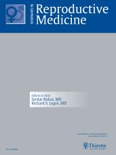
SEMINARS IN REPRODUCTIVE MEDICINE
Advancing the Frontiers of Reproductive HealthSEMINARS IN REPRODUCTIVE MEDICINE is a leading peer-reviewed journal dedicated to exploring the complexities of human reproduction, offering insightful perspectives that encompass advances in reproductive endocrinology, obstetrics, and gynecology. Published by THIEME MEDICAL PUBL INC, this esteemed journal holds a notable spot in multiple Scopus categories, ranking 21st in Reproductive Medicine and 38th in Obstetrics and Gynecology, with an impressive impact in the Q1 and Q2 quartiles. With its commitment to high-quality research and clinical implications, the journal serves as a vital resource for practitioners, researchers, and students alike, fostering an environment of innovation and collaboration in the rapidly evolving reproductive health landscape. SEMINARS IN REPRODUCTIVE MEDICINE also offers convenient open access options, ensuring that its contributions are readily available to the global academic community. For over two decades, from its establishment in 1999 to the present, it has retained a pivotal role in disseminating critical findings that inform both clinical practice and future research efforts.
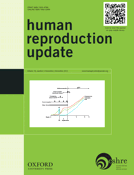
HUMAN REPRODUCTION UPDATE
Advancing Knowledge in Reproductive HealthHUMAN REPRODUCTION UPDATE, published by Oxford University Press, stands as a leading journal in the fields of Obstetrics and Gynecology and Reproductive Medicine. With an impressive Q1 ranking in both categories according to the 2023 category quartiles and a significant Scopus rank, it is recognized as one of the top journals globally in these disciplines, catering to the most relevant and cutting-edge research. The journal has been a crucial platform for disseminating vital findings and reviews from 1995 to 2024, contributing to advancements in human reproductive health. With its focus on publishing high-quality, peer-reviewed articles, it serves as an essential resource for researchers, healthcare professionals, and students seeking the latest insights and developments in reproductive science. As the journal aims to foster informed discussions and encourage further research, it remains committed to shaping the future of reproductive health and medicine.
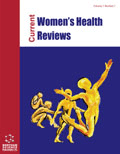
Current Womens Health Reviews
Advancing Understanding in Women's Health IssuesCurrent Women's Health Reviews is a prominent academic journal dedicated to the critical exploration of women's health issues from various scientific perspectives. Published by Bentham Science Publishers, this journal provides a forum for high-quality reviews and studies covering topics in obstetrics and gynecology. Since its inception in 2006, the journal has developed a notable reputation within the academic community, despite its current Q4 ranking in Obstetrics and Gynecology and a relatively lower Scopus rank of #152 out of 209. The journal strives to present current advancements and comprehensive reviews that foster better understanding and innovation in women's health, making it a valuable resource for researchers, professionals, and students alike. It also serves as a platform that encourages collaboration and communication among scholars, ensuring that vital issues concerning women's health are highlighted and addressed effectively.

THERIOGENOLOGY
Empowering the future of animal husbandry with impactful studies.THERIOGENOLOGY is a prestigious academic journal published by Elsevier Science Inc, dedicated to the field of veterinary reproduction and animal science. With an impressive impact factor and recognized as a Q1 journal in various categories including Animal Science and Zoology, Equine, Food Animals, and Small Animals, THERIOGENOLOGY has established itself as a vital resource for researchers, practitioners, and students alike. Founded in 1974, the journal covers a broad spectrum of topics related to reproductive physiology, biotechnology, and the health management of food and companion animals. Although it does not currently offer open access, researchers can benefit from its comprehensive articles and reviews that push the boundaries of knowledge in veterinary science. With a significant placement in the Scopus rankings, ranking #1 in multiple veterinary categories, THERIOGENOLOGY serves as an essential platform for advancing the understanding of reproductive strategies and practices, thereby contributing directly to the fields of animal husbandry and veterinary medicine.
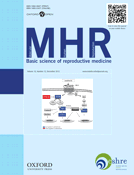
MOLECULAR HUMAN REPRODUCTION
Connecting Molecular Mechanisms to Clinical Practice in ReproductionMOLECULAR HUMAN REPRODUCTION, published by Oxford University Press, is a pivotal journal dedicated to advancing the field of reproductive biology. Since its inception in 1995, the journal has been recognized for its rigorous peer-reviewed research and substantial contributions to the understanding of molecular mechanisms underlying human reproduction. With an impressive impact factor and ranked within the top tiers (Q1 and Q2) across diverse categories including Embryology, Obstetrics and Gynecology, and Reproductive Medicine, it stands as an essential resource for researchers, healthcare professionals, and students alike. The journal aims to publish cutting-edge research that explores the complexities of human reproduction at the molecular and cellular levels, fostering a deeper understanding that can be translated into clinical practice. Although it currently operates under a subscription model, the valuable insights and groundbreaking findings featured within its pages continue to influence the trajectory of reproductive health research globally. Located in the heart of Oxford, United Kingdom, the journal remains committed to addressing vital challenges in the field and promoting innovative scientific dialogue.